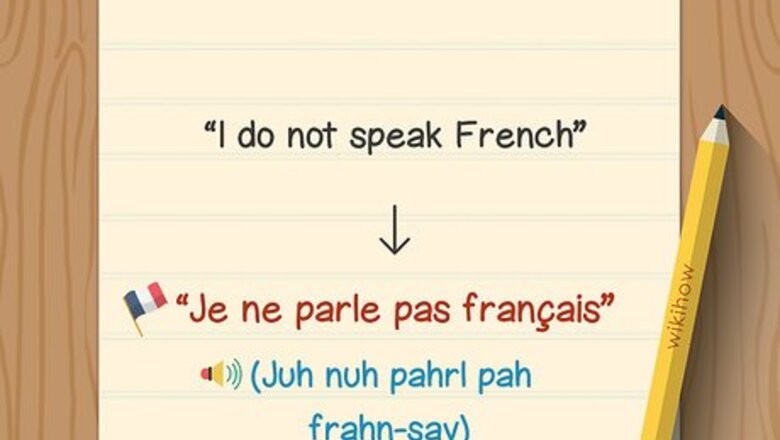
views
X
Research source
so chances are you will meet one of them some day. If you meet a French person and you haven't a clue what they're saying to you, it helps to let them know quickly that you don't speak their language. You can do this by using some simple phrases, or via non-verbal communication.
Communicating Verbally
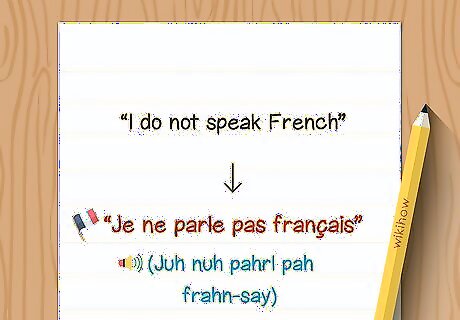
Say "Je ne parle pas français." This means, "I do not speak French." It is pronounced: "Juh nuh pahrl pah frahn-say" (French speakers often leave out the "ne" in a negative sentence, or more commonly, slide it into the first word like "zhun" instead of "juh nuh". However, in writing always include the "ne"). If you speak a little French and want to tell the person that, you can say: "Je parle juste un peu français." This is pronounced: "Juh pahrle joost un puh frahn-say." It translates to, "I speak just a little bit of French." Say: "Je suis désolé." This means simply, "I'm sorry," and can be combined with non-verbal gestures to communicate a lack of understanding. This is pronounced: "juh swee day-zo-lay." If you're feeling ambitious (and polite), you can combine this with the previous step, saying "Je suis désolé, je ne parle pas francais." This is pronounced: "juh swee day-zo-lay, juh nuh pahrl pah frahn-say." This means, "I'm sorry, I don't speak French."
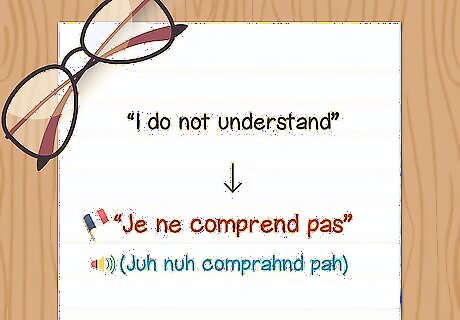
Say "Je ne comprend pas." This means, "I do not understand." It is pronounced "Juh nuh comprahnd pah." This is less preferable to saying "Je ne parle pas français," because the French person might misunderstand what you mean and try to explain what they said by speaking more French! However, if you can't remember "Je ne parle pas français," "Je ne comprend pas" is better than nothing.
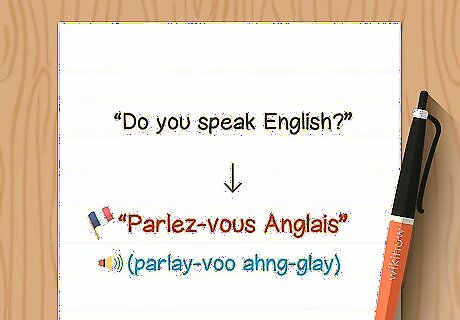
Ask the other person if they speak your language. If you let the person know what language you do speak, they will know you don't speak French, and you may be able to communicate if the other person in another language. Say "Parlez-vous..." (pronounced "parlay-voo" This means, "Do you speak...." Here are the French words for some other languages: Anglais (pronounced "ahng-glay"): English Espagnol (pronounced "esspanyoll"): Spanish Japonais (pronounced "japonay"): Japanese Allemand (pronounced "allaymon"): German Arabe (pronounced "ahrahbuh"): Arabic
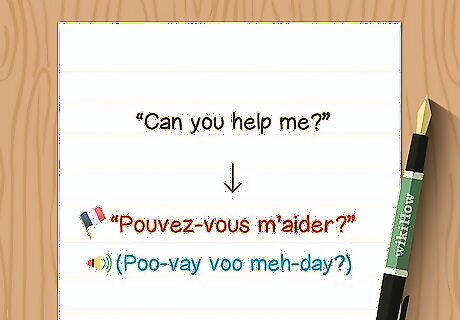
Ask for help. If you are in a French speaking country and are lost or otherwise need help, you may need to ask for assistance while communicating that you don't speak French. You can say a couple of things in this situation: "Pouvez-vous m'aider? Je ne parle pas français." means, "Can you help me? I don't speak French." It is pronounced, "Poo-vay voo meh-day? Juh nuh pahrl pah frahn-say." "Je suis perdu. Je ne parle pas français" means "I'm lost. I don't speak French." It is pronounced, "Ju swee pair-doo. Juh nuh pahrl pah frahn-say."
Communicating Nonverbally

Shrug your shoulders. If someone tries to speak French to you and you can't remember any of the phrases above, you may need to communicate your inability to undersand non-verbally. Shrugging your shoulders is a near universal gesture for indicating a lack of knowledge or understanding. Shrugging your shoulders can also have a connotation of apology, indicating regret for your inability to understand.

Use your face. In addition to shrugging, you can make a confused face to show a lack of understanding. Asymmetrical facial expressions are often understood as a sign of confusion. For example, raising one eyebrow while lowering the other is often interpreted as a sign of confusion.

Gesture with your hands. Turn your palms up while raising your hands from your sides also indicates uncertainty or confusion. Just don't get too enthusiastic with your gestures. You don't want to appear aggressive or be rude.




















Comments
0 comment